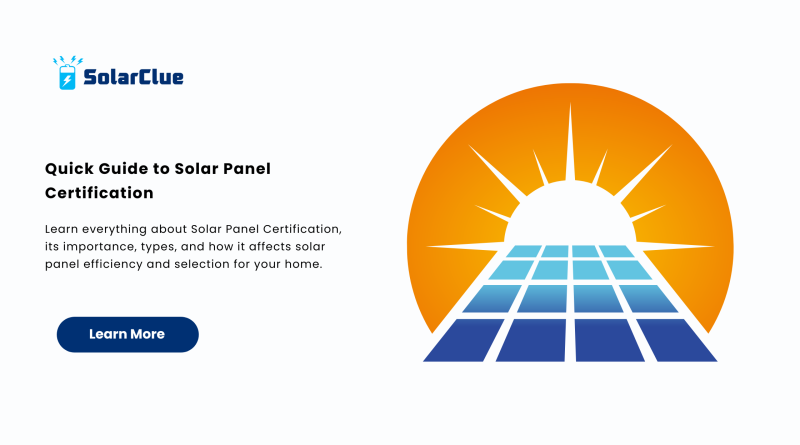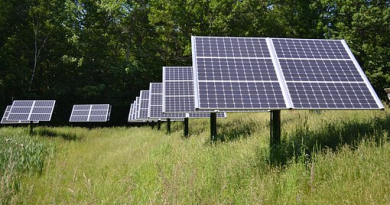Quick Guide to Solar Panel Certification
In today’s energy-conscious world, more homeowners and businesses are turning to solar power as a clean, cost-effective alternative. But before you invest in a solar panel for home or a full-fledged solar power system, it’s crucial to understand the significance of Solar Panel Certification. Certification not only validates the safety and performance of the panels but also ensures you’re eligible for government incentives and subsidies. Whether you’re planning a rooftop installation or a large-scale solar project, knowing which certifications to look for can make all the difference in maximizing your system’s reliability and solar panel efficiency.
Table of Contents
- 1 What is Solar Panel Certification?
- 2 Why is Solar Panel Certification Important?
- 3 Common Solar Panel Certification Standards
- 4 How to Check If a Solar Panel is Certified
- 5 Impact of Certification on Solar Panel Efficiency
- 6 Certifications to Look For When Buying Solar Panels
- 7 Certified vs. Non-Certified Panels: What’s the Difference?
- 8 Do Certifications Influence Solar Panel Cost?
- 9 Certifications Needed for Government Subsidy in India
- 10 Solar Panel Certification Process: Step-by-Step
- 11 Frequently Asked Questions About Solar Panel Certification
- 12 Choosing the Right Certified Solar Panel for Home Use
- 13 The Role of Certification in a Solar Power System
- 14 Final Thoughts on Solar Panel Certification
- 15 Additional FAQs:
What is Solar Panel Certification?
Solar Panel Certification refers to a validation process by regulatory authorities that ensures a solar panel meets safety, quality, and performance standards. Certification helps consumers choose reliable products and ensures panels perform optimally under different environmental conditions.
Why is Solar Panel Certification Important?
Certified panels guarantee compliance with national and international standards. This protects homeowners and businesses from faulty or underperforming systems and is especially crucial when investing in a solar power system for long-term energy needs.
Common Solar Panel Certification Standards
1. IEC Certification
Issued by the International Electrotechnical Commission, this certification evaluates durability, thermal cycling, and mechanical load tests.
2. UL Certification (UL 1703 & UL 61730)
This is a key safety standard for North America, verifying electrical safety and fire resistance.
3. BIS Certification (India Specific)
In India, Bureau of Indian Standards (BIS) certifies panels under IS 14286 and IS 61730 guidelines, which is mandatory for selling solar modules in India.
How to Check If a Solar Panel is Certified
1. Manufacturer’s Website
Visit the manufacturer’s official site and look for downloadable certification PDFs.
2. Product Labels and Datasheets
Every certified solar panel for home should have visible labeling for quick verification.
3. Government and Regulatory Portals
For example, MNRE (Ministry of New and Renewable Energy) maintains a list of approved vendors and certified panels in India.
Impact of Certification on Solar Panel Efficiency
Certified panels are rigorously tested for performance, directly affecting solar panel efficiency. These tests confirm how well a panel converts sunlight into usable electricity, ensuring your solar power investment is worth it.
Certifications to Look For When Buying Solar Panels
- IEC 61215 (performance)
- IEC 61730 (safety)
- ISO 9001, 14001 (manufacturing & environmental standards)
- NABL (testing labs in India)
Certified vs. Non-Certified Panels: What’s the Difference?
Certified panels:
- Offer higher solar panel efficiency
- Are eligible for subsidies
- Come with warranties (typically 25 years)
- Qualify for insurance claims
Non-certified panels:
- Often lack quality assurance
- May void warranties or insurance
- Are generally not eligible for government incentives
Do Certifications Influence Solar Panel Cost?

Yes. Certified panels may cost slightly more upfront, but the long-term benefits like higher performance, longer lifespan, and government rebates make them more economical.
Certifications Needed for Government Subsidy in India
To avail of subsidies under the Rooftop Solar Program, the solar panel must be:
- BIS certified
- From MNRE-empaneled vendors
Solar Panel Certification Process: Step-by-Step
- Application by manufacturer to a certified lab
- Testing under simulated conditions
- Documentation review
- Audit of manufacturing process (optional)
- Certification issued and added to public database
Frequently Asked Questions About Solar Panel Certification
1. Can I install a non-certified solar panel at home?
You can, but it’s not advisable due to safety and performance risks.
2. Does certification affect solar warranties?
Absolutely. Most warranties are void without valid solar panel certification.
3. Are certified panels mandatory in all countries?
In many, including India and the U.S., certification is legally required for sales and installation.
4. Is solar certification required for net metering?
Yes, especially for solar panel for home setups under net metering policies.
5. How do I verify if my panel is certified?
Check the datasheet, manufacturer’s website, or consult the MNRE/BIS registry.
Choosing the Right Certified Solar Panel for Home Use
When selecting a solar panel for home, prioritize:
- Reputed brand with clear certifications
- Warranty of at least 25 years
- Verified reviews
- High solar panel efficiency rating
The Role of Certification in a Solar Power System
A solar power system includes panels, inverters, batteries, and mounting structures. Certification ensures every component works safely and efficiently under real-world conditions.
Final Thoughts on Solar Panel Certification
Solar Panel Certification is not just a bureaucratic checkbox—it’s your assurance of quality, safety, and performance. Investing in certified panels means peace of mind, better returns, and eligibility for financial incentives.
Looking to make an informed decision about your solar investment? Visit our website solarclue.com and explore more detailed insights on blog.solarclue.com to power your choices with confidence.
Additional FAQs:
Q1: What are the top certifications for solar panels globally?
A: IEC, UL, BIS, and ISO standards are globally recognized for solar panel safety and performance.
Q2: Do certifications differ for commercial vs residential panels?
A: Yes, some certifications are tailored for large-scale or grid-tied systems versus residential setups.
Q3: How often do solar panels need re-certification?
A: Certifications are usually valid for the product’s life but updates may be required if standards change.
Q4: Are imported solar panels certified in India?
A: Only if they acquire BIS certification and are listed by MNRE.
Q5: What should I do if my panel isn’t listed in MNRE’s certified list?
A: Contact your vendor or consider switching to a listed and certified brand to avoid future issues.




